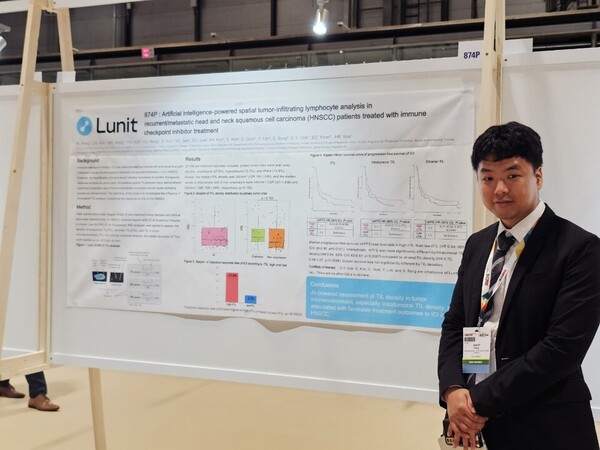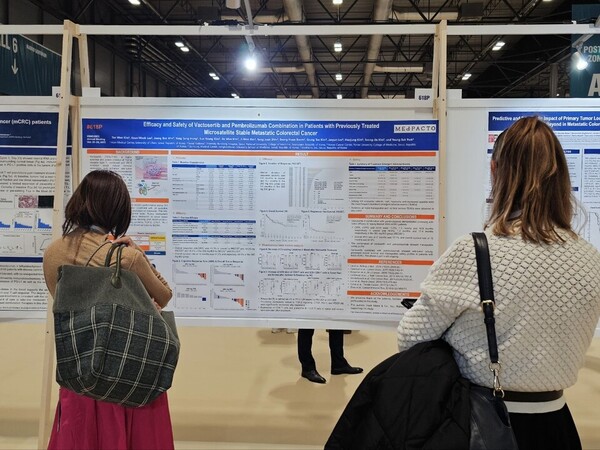
MADRID -- By Kim Chan-hyuk Korea Biomedical Review correspondent -- At the European Society for Medical Oncology Annual Meeting (ESMO 2023), one of the world's top three cancer societies, Korean biotech companies, including Lunit, Medpacto, and TiumBio, highlighted their research achievements through poster presentations.
On Sunday (local time), the third day of the ESMO 2023 in Madrid, Spain, a large crowd gathered to listen to their poster presentations.
In addition to the presenters who explained their work, the congress hall was bustling with visitors as they toured each research project.

One of the poster presentations featured research results utilizing Lunit's AI biomarker platform, Lunit SCOPE IO, developed by the Korean medical artificial intelligence solution developer.
The study used Lunit SCOPE IO to analyze tumor-infiltrating lymphocytes (TILs) in patients with recurrent or metastatic head and neck squamous cell carcinoma (HNSCC) treated with immune checkpoint inhibitors (ICIs) to predict response to immuno-oncology drugs.
The researchers at Severance Hospital collected H&E-dyed whole slide images (WSIs) of pre-treatment tumor samples and clinical data from recurrent and metastatic head and neck squamous cell carcinoma patients treated with ICIs and evaluated the density of intratumoral TILs (iTILs), stromal TILs (sTILs), and TILs in the tumor microenvironment (tTILs).
Dr. Hong Moon-ki, professor of medical oncology at the Yonsei Cancer Hospital Palliative Care Center, who presented the poster, said, "Research using AI to analyze pathology slides has been published in the Journal of Clinical Oncology (JCO) with significant results in non-small cell lung cancer. This study extends the application to the head and neck."
In the study, the objective response rate of ICI according to RECIST v1.1 was higher in high-tTILs compared to low-tTILs (21.6 percent vs. 5.7 percent; p=0.0220), and median progression-free survival (PFS) was favorable in high-tTILs compared to low-tTILs (3.2 months vs. 1.6 months; HR 0.59, 95 percent CI 0.39-0.90, p=0.0151).
Notably, PFS was more significantly different according to iTIL density (HR 0.64, 95 percent CI 0.42-0.97, p=0.0367) than sTIL density (HR 0.70, 0.46-1.07, p=0.0999). However, overall survival did not differ significantly by TIL density.
The researchers concluded that AI-based assessment of the tumor microenvironment, particularly intratumoral TIL density, was associated with favorable treatment outcomes for ICI in recurrent, advanced head and neck squamous cell carcinoma.
However, Professor Hong added, "Although patients with higher TILs appeared more responsive to ICI, further research is still needed, and a multicenter study is currently being prepared. The study will also compare with the docetaxel group as a control group."
On the possibility of using AI for digital pathology, Hong said, "Pathologists' workloads are increasing, so it would be nice to help in that regard. It remains to be seen if AI will help or require more labor."
Besides, the results of nine studies utilizing Lunit Scope IO were also revealed.

On the other hand, a poster presentation by another Korean company, Medpacto, was held.
The poster presented an update on safety and efficacy data from a phase 1b/2a clinical trial of Vactosertib combined with Keytruda (pembrolizumab) in previously treated patients with microscopically stable metastatic colorectal cancer (MSS mCRC).
According to the poster, a total of 105 patients were enrolled (36 at 200 mg BID, 30 at 200 mg QD, 7 at 200 mg TID, and 32 at 300 mg BID), with an objective response rate (ORR) of 13.3 percent [95 percent CI, 7.5-21.4] and a median duration of response (DoR) of 6.0 months (95 percent CI, 2.9-not reached [NR]).
Median PFS and overall survival (OS) were 1.3 months (95 percent CI, 1.2-1.4) and 15.8 months (95 percent CI, 7.9-NR), respectively. The overall PFS rate at 6 months is 17.1% (95 percent CI, 10.5-25.7), and the overall survival rate at 12 months is 61.0% (95 percent CI, 51.0-70.3).
Rash, headache, and decreased appetite were the most frequent treatment-emergent adverse events (TEAEs), but all were manageable. No serious, life-threatening TEAEs were observed in any cohort.
The researchers, led by Dr. Kim Tae-won, a professor of medical oncology at Asan Medical Center, concluded that the combination of Vactosertib and pembrolizumab demonstrated antitumor activity, prolonged overall survival and a manageable safety profile in patients with MSS mCRC. The phase 2 study is ongoing.

Meanwhile, Kim Hun-taek, CEO of TiumBio, said, "I have reviewed the presentations on VEGF inhibitors, which are competing with our TU2218, and found ours to be showing promising results."
TiumBio presented phase 1a data on TU2218, an immuno-oncology candidate that simultaneously inhibits TGF-ß and VEGF, at a poster presentation on Monday (local time).
Related articles
- [ESMO 2023] Keytruda cements its position as 1st-line treatment for HER2+ gastric cancer
- [ESMO 2023] ‘HLB will apply for European authorization for rivoceranib this year’
- [ESMO 2023] Global competition for anticancer therapies opens yearly event in Europe
- [ESMO 2023] Yuhan's NSCLC drug Leclaza shows potential as 1st Korean blockbuster drug
- Lunit, 1st Korean firm to join Saudi Vision 2030 Healthcare Sandbox, aims AI-powered cancer care
- Phase 3 trial results for NSCLC using Lunit Scope published in JCO
- [CPHI 2023] Prestige Biopharma embraces open innovation for new antibody drugs
- [ESMO 2023] GI Innovation lays ground for Keytruda’s clinical trials
- Lunit agrees with MD Anderson on AI-based research of immunotherapies’ efficacy
- MedPacto’s new drug candidate for bone disease included in national projects

